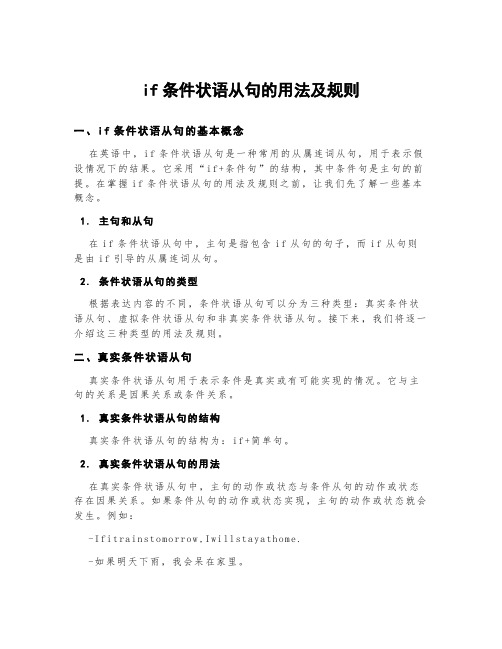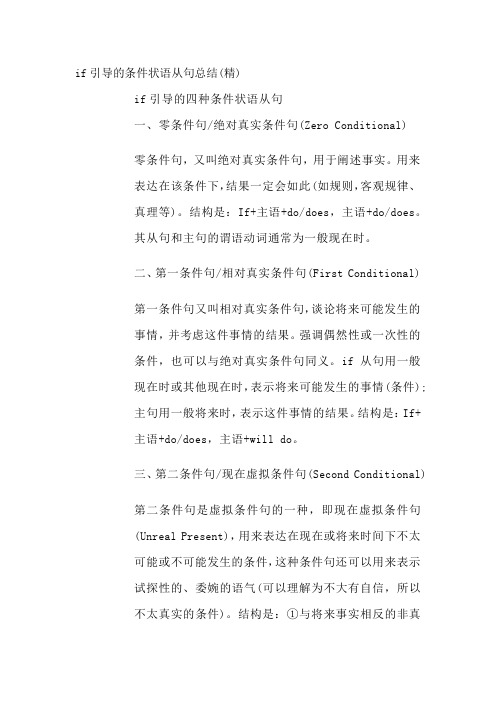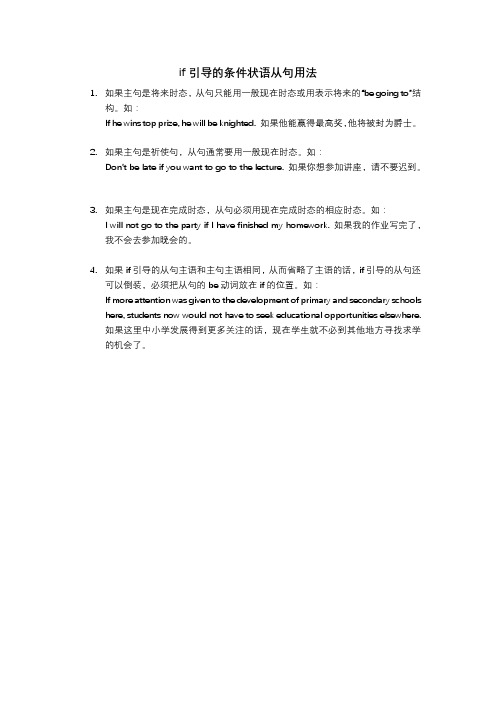If引导条件状语从句的详细用法解答
if条件状语从句的用法及规则

if条件状语从句的用法及规则一、i f条件状语从句的基本概念在英语中,i f条件状语从句是一种常用的从属连词从句,用于表示假设情况下的结果。
它采用“i f+条件句”的结构,其中条件句是主句的前提。
在掌握i f条件状语从句的用法及规则之前,让我们先了解一些基本概念。
1.主句和从句在i f条件状语从句中,主句是指包含if从句的句子,而i f从句则是由if引导的从属连词从句。
2.条件状语从句的类型根据表达内容的不同,条件状语从句可以分为三种类型:真实条件状语从句、虚拟条件状语从句和非真实条件状语从句。
接下来,我们将逐一介绍这三种类型的用法及规则。
二、真实条件状语从句真实条件状语从句用于表示条件是真实或有可能实现的情况。
它与主句的关系是因果关系或条件关系。
1.真实条件状语从句的结构真实条件状语从句的结构为:if+简单句。
2.真实条件状语从句的用法在真实条件状语从句中,主句的动作或状态与条件从句的动作或状态存在因果关系。
如果条件从句的动作或状态实现,主句的动作或状态就会发生。
例如:-I fi tr ai ns to mo rro w,I wi ll st ay at hom e.-如果明天下雨,我会呆在家里。
上述例句中,条件从句“if it ra in st omo r ro w”表达的是“下雨”的情况,主句“Iw il ls t ay at ho me”表示的是因果关系,即如果明天下雨,我将呆在家里。
三、虚拟条件状语从句虚拟条件状语从句用于表示条件是不真实、不可能实现或对现实进行推测的情况。
1.虚拟条件状语从句的结构虚拟条件状语从句的结构为:if+过去完成时。
2.虚拟条件状语从句的用法在虚拟条件状语从句中,条件从句的动作或状态无法实现,主句的动作或状态也会受到影响。
例如:-I fI ha ds tu di ed har d er,I wo ul dh av epa s se dt he ex am.-如果我学得更努力,我就能通过考试了。
知识点名:if引导的条件状语从句

知识点名:if引导的条件状语从句讲义:if引导的条件状语从句1. if意为“如果”,引导条件状语从句时,既可放在主句前面,也可放在主句后面。
若if条件句放在句首,从句后面常加逗号与主句隔开。
If you go there, I'll go, too.如果你去那儿,我也会去。
My mother will take me to the park if she is free.如果我妈妈有空,她就会带我去公园。
2. 时态运用:在含有if引导的条件状语从句的主从复合句中,主句为下列情形之一的,条件状语从句通常用一般现在时。
(1) 主句是一般将来时,即遵循“主将从现”的原则。
If he comes, he will bring his violin.如果他来,他就会把他的小提琴带来。
(2) 主句是含有情态动词may/might/can/must/should等的句子。
If you want to lose weight, you must eat less bread.如果你想减肥,你必须少吃面包。
(3) 主句是祈使句。
If you are not strong enough, please don't take part in such an activity.如果你不是很健壮,请不要参加这种活动。
3. 句型转换:(1) 借助“祈使句+and/or+陈述句(一般将来时)”这一句型来转换。
其中,在句意上and表示顺承;or表示转折,意为“否则”。
If you work hard, you'll pass the exam easily.=Work hard, and you'll pass the exam easily.努力学习,你将很容易通过考试。
Work hard, or you won't pass the exam easily.努力学习,否则你不会轻易地通过考试。
if状语从句的用法

if状语从句的用法1. if 引导的条件状语从句(真实条件句)用在if引导的条件状语从句中,表示在某种条件下很可能发生时,就是真实条件句,通常从句用一般现在时,主句用将来时态或者情态动词+动词原形或者祈使句的形式。
1 if从句用一般现在时,主句用一般将来时例If he runs he’ll get there in time. 如果他跑的话,他就会及时赶到那儿。
The cat will scratch you if you pull its tail. 如果你拉这只猫的尾巴,它就会抓你。
2 if从句用一般现在时,主句用may/might/can+动词原形例If the fog gets thicker the plane may/might be diverted. 如果雾再大一些,飞机可能就会改在别的机场降落。
If it stops snowing we can go out. 如果雪停了,我们就可以出去。
3 if从句用一般现在时,主句用must/should+动词原形例If you want to lose weight you must/should eat less bread. 如果你想减肥,就必须/应该少吃面包。
4 if从句用一般现在时,主句用一般现在时例If you heat ice it turns to water.(也可用will turn)如果你给冰加热,它就会化成水。
5 if从句用现在进行时,主句用一般将来时例If you are looking for Peter you’ll find him upstairs. 如果你是在找彼得,上楼就会找到他。
6 if从句用现在完成时,主句用一般将来时例If you have finished dinner I’ll ask the waiter for the bill. 如果你吃完了,我就叫服务生来结账。
2. If引导的条件状语从句(虚拟条件句)用表示的内容与现在事实相反,if从句用一般过去时,主句用“would/should/could/might+动词原形”;表示与过去事实相反,if从句用had+动词的过去分词,主句用would/should/could/might+have+动词的过去分词;表示对将来情况的主观推测,if从句用①should+动词原形②were to+动词原形,主句用would/should/could/might+动词原形。
if引导的条件状语从句总结(精)

if引导的条件状语从句总结(精)if引导的四种条件状语从句一、零条件句/绝对真实条件句(Zero Conditional)零条件句,又叫绝对真实条件句,用于阐述事实。
用来表达在该条件下,结果一定会如此(如规则,客观规律、真理等)。
结构是:If+主语+do/does,主语+do/does。
其从句和主句的谓语动词通常为一般现在时。
二、第一条件句/相对真实条件句(First Conditional)第一条件句又叫相对真实条件句,谈论将来可能发生的事情,并考虑这件事情的结果。
强调偶然性或一次性的条件,也可以与绝对真实条件句同义。
if从句用一般现在时或其他现在时,表示将来可能发生的事情(条件);主句用一般将来时,表示这件事情的结果。
结构是:If+主语+do/does,主语+will do。
三、第二条件句/现在虚拟条件句(Second Conditional)第二条件句是虚拟条件句的一种,即现在虚拟条件句(Unreal Present),用来表达在现在或将来时间下不太可能或不可能发生的条件,这种条件句还可以用来表示试探性的、委婉的语气(可以理解为不大有自信,所以不太真实的条件)。
结构是:①与将来事实相反的非真实条件句是If+主语+should do/were to do/did,主语+would/should/could/might do;②与现在事实相反的非真实条件句是If+主语+did,主语+would/should/could/might+do。
四、第三条件句/过去虚拟条件句(Third Conditional) 第三条件句是表示与过去事实相反的虚拟语气,是用来表达如果(If)当时那样发生,另外一方面(当时)结果会如何。
通常是指过去的事情,带有一切已经太迟而不能够补救的意思。
结构是:If+主语+had done,主语+would/should/could/ might+have done。
if 条件句的时态搭配1.if从句用一般现在时,主句用一般将来时2.if从句用一般现在时,主句用may/might/canIf the fog gets thicker the plane may/might be diverted.3.if从句用一般现在时,主句用must/shouldIf you want to lose weight you must/should eat less bread.4.if从句用一般现在时,主句用一般现在时5.if从句用现在进行时,主句用一般将来时6.if从句用现在完成时,主句用一般将来时If you have finished dinner I’ll ask the waiter for the bill.。
If引导的条件状语从句知识讲解

2. 借助介词with 或without来转换。
例如: If you help me, I’ll finish my job soon.
W--i-t-h--y--o-u--r--h--e-l-p-, I’ll finish my job soon. 如果你帮我,我将很快完成我的工作。 If there is no water, fish may die.
• 2. 在if引导的条件状语从句中不能够使用some, 而要用any。
• 例如: If you have any questions to ask, please come to my office. 如果你有问题要问的 话,请到我办公室来。
1. if 在句中的含义不同 I want to know if he is a teacher.
3 If she ___d_o_e_s_n_’t_g_e_t____(not get ) up early , she’ll miss the early bus .
3. 时态要求上有区别
1.I want to know if there will be
a
sports meeting next month.
If 引导的宾语从句的时态由主句及本身时
态决定;
2.If it doesn’t rain , we’ll hold it.
If 引导条件状语从句的时态为一般现在时 记住“主将从现”
I won’t go there _____ I _____hear from you. I won’t go to the party if I am not invited. (同义句)
if引导的条件状语从句用法

if引导的条件状语从句用法
1.如果主句是将来时态,从句只能用一般现在时态或用表示将来的“be going to”结
构。
如:
If he wins top prize, he will be knighted. 如果他能赢得最高奖,他将被封为爵士。
2.如果主句是祈使句,从句通常要用一般现在时态。
如:
Don’t be late if you want to go to the lecture. 如果你想参加讲座,请不要迟到。
3.如果主句是现在完成时态,从句必须用现在完成时态的相应时态。
如:
I will not go to the party if I have finished my homework. 如果我的作业写完了,
我不会去参加晚会的。
4.如果if引导的从句主语和主句主语相同,从而省略了主语的话,if引导的从句还
可以倒装,必须把从句的be动词放在if的位置。
如:
If more attention was given to the development of primary and secondary schools here, students now would not have to seek educational opportunities elsewhere.
如果这里中小学发展得到更多关注的话,现在学生就不必到其他地方寻找求学的机会了。
if条件状语从句的用法_If引导的条件状语从句

if条件状语从句的用法_If引导的条件状语从句很多英语学习者都觉得If引导的条件状语从句这个句型很难,学习起来很吃力。
下面是小编为你整理的If引导的条件状语从句的相关资料,希望大家喜欢!If引导的条件状语从句用法1.if引导的条件状语从句可以放在主句之前,也可以放在主句之后,如果放在主句之前,中间要用逗号将主句和从句隔开。
例如:If I am free, I will come to see you.= I will come to see you if I am free.如果我有空,我就来看你。
2. 在含if引导的条件状语从句的复合句中,主句用一般将来时,从句通常用一般现在时态表示将来意义,即主将从现原则。
例如:If it snows tomorrow, we will go skiing.如果明天下雪,我们就去滑雪。
3. 在含if引导的条件状语从句的复合句中,语句的谓语还可含有情态动词can、must、may等,主句也可是祈使句。
例如:If it stops raining, we can go out.如果雨停了,我们就能出去。
4. 在含if引导的条件状语从句的复合句中,如果主句部分描述的是客观事实或真理,要用一般现在时。
例如:If you heat the ice, it turns into water.如果你加热冰,它就会变成水。
if引导的非真实条件句对过去的虚拟条件从句(if):主语+had done 主句might/would/should/could+have done 对现在的虚拟if+ 主语+动词过去式(be用were)主句might/would/should/could+do对将来的虚拟if+主语+动词过去式(be用were)或主语+should do或主语+were to do主句might/would/should/could+doe.g.Tom got to the station in time because he started earlier.If Tom had started late, he would have missed the train.Do you think the thief entered through the door?No, if he had, I don't believe, he would have broken the living room window.If the book weren't so expensive, I would buy it.If you didn't live so far away, we would be able to visit you more.What would you do if you lost your passport in a foreign country?Why hasn't he come? If he should not come on time, we would have to put off the trip.2.注意事项e.g.If she hadn't work hard at English in the past, she wouldn't work as well as a secretary in a large company now. 混合时间的虚拟语气从句为对过去的虚拟,主句是现在。
小学英语if 引导的条件状语从句讲解

if引导的条件状语从句(包含主将从现原则)一.if的位置:if“如果”,当引导条件状语从句时,既可以放在主句前面,也可以放在主句后面。
若if引导的条件句放在句首,从句后面要加逗号与主句隔开。
例如:My mother will take me to the park if she is free.如果我妈妈有空,她就会带我去公园。
If my mother is free, she will take me to the park.如果我妈妈有空,她将会带我去公园。
(此句if引导的条件状语从句位于句首,主句位于其后,所以要用逗号隔开)二.时态的运用注意:在if的条件状语从句中,主句为下列情形之一时,if条件状语要用一般现在时。
1.主句是一般将来时(主将从现)例如:If he comes, he will tell me all.如果他来了,他会告诉我所有(的事情)。
(这个知识点在初中阶段是常考题,简称“主将从现”——主句是一般将来时态,从句是一般现在时态。
本句中主句是由will引导的一般将来时态的句子,从句是由if引导的一般现在时态的句子,符合主将从现的法则。
)2.主句是含有情态动词may/might/can/must/should等句子。
例如:If you want to lose weight, you must eat less bread.如果你想减肥,你必须少吃面包。
(主句中含有情态动词must,所以if引导的条件状语从句要用一般现在时态。
)3.主句是祈使句例如:If you are not strong enough, please don't take part in such an activity.如果你不够强壮,请不要参加这种活动。
(主句是一个Do型的祈使句,所以根据原则,if从句要用一般现在时态。
——不清楚Do型祈使句的小伙伴可以查看冉老师历史发文记录)三.习题1.If you to be a rich man ,you should try hard.A. wantingB. wantedC. wantD.are want2. If you English, you can be an English teacher.A. likingB. likedC. likeD. are like3. If you like sports , you a PE teacher.A. areB. mustC. can beD. could。
- 1、下载文档前请自行甄别文档内容的完整性,平台不提供额外的编辑、内容补充、找答案等附加服务。
- 2、"仅部分预览"的文档,不可在线预览部分如存在完整性等问题,可反馈申请退款(可完整预览的文档不适用该条件!)。
- 3、如文档侵犯您的权益,请联系客服反馈,我们会尽快为您处理(人工客服工作时间:9:00-18:30)。
If引导条件状语从句的详细用法解答
引导条件状语从句最常用的连词是if,常见的if条件状语从句表示在某条件下,某事很可能发生,条件是可能存在的,主句中某种情况发生的概率也是很高的。
如:
If you ask him,he will help you.如果你请他帮忙,他会帮你的。
If you fail in the exam,you will let him down.如果你考试不及格,你会让他失望的。
If you have finished the homework,you can go home.如果你作业做完了就可以回家了。
另外,if从句还表示不可实现的条件或根本不可能存在的条件,也就是一种虚拟的条件或假设。
从句多用一般过去时或过去完成时,表示对现在或过去的一种假设。
如:
If I were you,I would invite him to the party.如果我是你,我会邀请他参加聚会。
I would have arrived much earlier if I had not been caught in the traffic.要不是交通堵塞,我本会来得早一些。
另外你还要注意if 条件句的时态搭配
1.if从句用一般现在时,主句用一般将来时
If he runs he’ll get there in time. 如果他用跑的,他就会及时赶到那儿。
The cat will scratch you if you pull her tail. 如果你拉猫的尾巴,它就会抓你。
2.if从句用一般现在时,主句用may/might/can
If the fog gets thicker the plane may/might be diverted. 如果雾在大一些,飞机可能就会改在别的机场降落。
If it stops snowing we can go out. 如果雪停了,我们就可以出去。
3.if从句用一般现在时,主句用must/should
If you want to lose weight you must/should eat less bread. 如果你想减肥,你必须少吃面包。
4.if从句用一般现在时,主句用一般现在时
If you heat ice it turns to water. (也可用will turn)如果把冰加热,它就会化成水。
5.if从句用现在进行时,主句用一般将来时
If you are looking for Peter you’ll find him upstairs. 如果你是在找彼得,上楼就会找到他。
6.if从句用现在完成时,主句用一般将来时
If you have finished dinner I’ll ask the waiter for the bill. 如果你吃完了,我就叫服务生来算账
注意:
学习" if " 引导的条件状语从句的用法,现在总结一下:
if 条件句不一般,几个要点记心间;
条件句,放在前,逗号要放句中间。
条件句表可能,主句多用将来时;
条件句表事实,主句常用现在时。
在if 引导的条件状语从句中,如果从句谈论的是一个有可能发生的事实及其产生的相关的结果,主句用一般将来时态,从句用一般现在时态。
如:We can walk there if we can't find a bus .
If it rains tomorrow ,we will not go to the zoo.
What will you do if you find a panda in danger.
如果if 条件句谈论的是重复发生和预示要发生的情景和事件,则主从句大多用一般现在时态。
如:
If bears are in danger ,they attack people.
在if 引导的条件状语从句中,if 和条件句位置灵活,可直接放在主句后面,若if 条件句放句首,从句后面要加逗号,和主句隔开。
还要注意前后时态一致原则。
